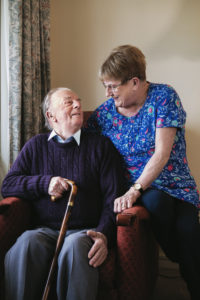Issue 2: Spring/Summer 2017
Care, Respite
When you care for someone like Sheila, you don’t get a single minute to yourself.

Ian is just one of many Freemasons for whom caring for an elderly, chronically ill or disabled family member is simply part of daily life. We believe no one should be expected to face the challenges of caring alone, so we provide grants to cover the cost of respite care for many Freemasons and their family members.
Respite care is any care arrangement designed to give rest or relief to unpaid carers so that they are able to carry on caring. There are different types of respite care available to support you and your loved one – each works on the basis of two principles: you need to share the responsibility for care giving and you need to get support for yourself.
When deciding what type of care to go for, you’ll need to start by analysing the needs of your family member and yourself – if you are unsure, our Advice & Support Team can help you with this. As a caregiver, what do you need most? Regular support throughout the day or a short-term break from your responsibilities every once in a while? It’s a good idea to keep track of your daily activities and make a list of the areas and times when you most need help.
Identifying your loved one’s requirements, abilities and preferences will also help you find the right match. Do they require assistance with walking, eating or medications? Are they in need of mental stimulation or exercise?
Answering these questions will help you determine which respite options to pursue. Once you have decided, get in touch with us – just like these people:
Suitable if your family member depends on you for help with personal care and other household tasks.
If you provide substantial care for a family member, it may be possible to arrange for a carer to visit at home and help with any daily activities you cannot safely manage on your own such as helping them to get dressed or showered. How often the carer visits and for how long depends on your individual requirements.
“Dad’s health started to deteriorate as he got older so he needed a carer to help him around the house. At first he was paying for the service out of his own pocket but money was so tight it got to the point where he wouldn’t put the heating or lights on and would buy out-of-date food.
A friend of Dad’s heard that he was struggling and told us about the MCF. Terry from the Advice & Support Team visited us at home and helped us with the application form. Soon after sending off the forms, we received grants to pay for Dad’s domiciliary care which has been vital as we recently had to increase the number of visits to four per day. Having the funding takes the pressure off both of us and dad doesn’t panic about not being able to afford it anymore.”
– Jeanette, Reginald’s daughter
Suitable if your family member lives at home but is isolated or lonely.
Adult day centres are designed for older people who can no longer manage independently, or who are isolated or lonely. The centres operate during the day and planned activities promote wellbeing in a safe, supportive and cheerful environment.

Alec and Linda
Alec: “I had to retire due to poor health and underwent two heart bypasses. My mobility declined and my daughter, Linda, moved to live closer to me so she could help around the house.”
Linda: “I have been caring for Dad with the help of my husband now for about 11 years. I visit Dad twice a day, seven days a week and he has a buzzer to call me any time, day or night. I enjoy caring for Dad but it can be overwhelming at times and my own health began to suffer due to the stress. It’s the loneliness that’s the worst – I am with Dad most days but he needs other people around him, not just me. The MCF pays for Dad to go to a day centre twice a week which helps with his loneliness but also allows me to spend time with my husband, children and grandchildren or focus on work.”
Alec: “I’ve got a lovely family, lovely neighbours and wonderful brethren. I want the brethren of my lodges to know how grateful I am and how thankful I am for all the help and support they’ve given me in the last 50 years of Freemasonry. Without them, I don’t know what I would do.”
Suitable if you need a short break to look after your own health and wellbeing.
If you are unable to carry out your caring responsibilities due to short-term ill health or simply needing a rest, residential care may be suitable. The person you are caring for will go for a short stay in a residential or nursing home.
We can fund up to six weeks of residential respite care which can be used at any point within a 12-month period.
“My wife, Pam, had a stroke nine years ago and has been disabled on her left side ever since. Carers visit four times a day, but outside of those visits I am responsible for Pam’s every need.
“Last summer I was diagnosed with a heart condition and was told I would need to have an operation that would require several weeks’ recovery time. I knew that Pam would need someone to look after her whilst I was in hospital, so I contacted my local council to see if they could help – they were able to cover some of the cost but I would need to come up with the rest myself.”
“The MCF covered the remaining cost and I went ahead with my surgery. The support meant I was able to focus on my own health so that I could recover and carry on my caring duties. We are extremely grateful.”
– Derek, Pam’s husband
Remember, having a break doesn’t mean you are letting down the person you care for. It’s sensible to have time to rest, catch up with friends and pursue your own interests.
If you feel you are struggling to cope emotionally with your responsibilities, we also offer a free, confidential counselling service. Call 0800 035 60 90 to access the service.
We cannot provide convalescent support, but you can find this from your NHS or private hospital, who have a duty of care after an operation.